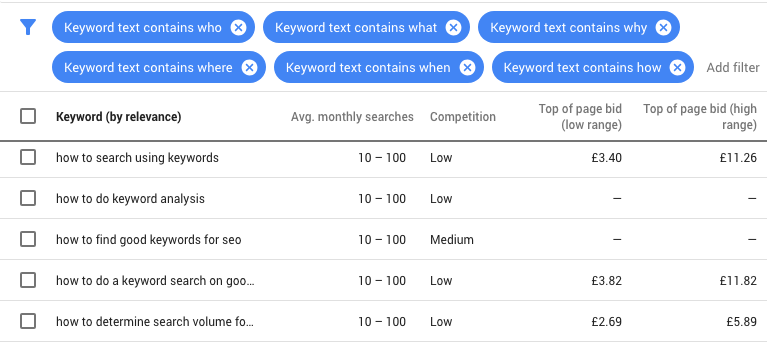
Keyword Selection for SEO Part III: Prioritizing Your Keywords
Jason RoyOnce you have found a select group of keywords and analyzed the kind of competition that is in the internet market place, it’s time to begin building a content strategy for optimizing your website using those specific keywords. This begins with determining the hierarchy of your keywords so that you can build a focused content strategy according to which keywords will add the most value to your site and help you to rank well with the search engines. The purpose of this article is to help you determine which keywords will take priority over others by analyzing their potential profitability and how each of your keywords relates to the central purpose of your site.
First Factor to Consider: The Cost Per Click of Your Keywords
According to Google ad words expert Perry Marshall, the Google Traffic Estimator (Found under the Google Keyword Tool), the maximum cost per click people are paying is a good example of the upper limit of the amount of money available in the market. In other words, if the estimated cost per click for the keyword: “Financial Services Professional” is $6.51 cents per click, that is a fair indicator that the maximum value per click for the keyword “Financial Services Professional” is close to $6.51.
So as you are analyzing your handful of basic keywords which you chose following the guidelines from part one of this series, you can use the Google traffic estimator to determine which keywords might have the most money available. Of course, having a higher conversion rate and a strong back-end sales process (upsells, etc.) can increase the amount of profit that you can earn from the keyword. But knowing the maximum CPC that bidders are willing to pay in order to advertise for that keyword will help you to determine the keywords which have the highest earning potential.
Determining Your Most Relevant Keywords
Cost per click is not the only factor to consider when determining the hierarchy of your keywords. Your quality score will also be very important when it comes to using strategies such as PPC marketing, content network marketing, and search partner marketing strategies to attract prospective customers to your site. You may find that the keyword on your list with the highest CPC is not quite as relevant as the keyword with the second-highest cost per click.
For example, if you have the keywords: “Financial Services Professional” with an estimated cost per click of $6.51, “Retirement Planning” with $7.01, and “Wealth Building Advice” with $9.04 and the primary function of your website is to assist with retirement planning, then it might be a good idea to make “Retirement Planning” your primary keyword. This will help you to establish a better quality score when using Adwords advertising and also to keep your optimization strategy consistent with the purpose of your site.
Building Your Onsite SEO Strategy Around Your Primary Keywords
Once you understand the earning potential of your keywords, their priority in regard to relevance, and the level of online competition for each keyword (see Article Two of this series), you should have a solid three keywords around which you can build an SEO strategy. It’s a good idea to have at least one webpage on your site which is optimized for each of those keywords, of course with your most important keyword taking precedent on your home page and being used throughout all the pages on your site. Once you have a solid strategy built around these primary keywords, you can move on to expanding your online influence by using secondary keywords.
Determining Your Secondary Keywords
Your secondary keywords can be determined using the same strategies which were covered in Articles One and Two of this Series. Your secondary keywords would be any keywords that you believe will generate qualified traffic for your website, but which are not as popular as your primary keywords. When determining your secondary keywords, it's important to remember that relevance is key when it comes to search engine optimization and online marketing. If you take a bunch of secondary keywords that you think will bring traffic to your site but which are not relevant to your primary keywords, you might end up frustrating a lot of visitors and marring your reputation with the search engines.
For best results, put your primary keywords into the Google Keyword Tool and look for the additional suggestions which are given in the results. Often times, good secondary keywords will include at least one word which is a part of your primary keywords and which is relevant to the central purpose of your site. For example, using the three keywords “Financial Services Professional,” “Retirement Planning” and “Wealth Building Advice,” a few good secondary keywords might be: “Affordable Financial Services,” “Retirement Planning” and “Financial Advice.”
Another helpful tool for determining secondary keywords is the Google Wonder Wheel, which suggests your secondary keywords based on what Google considers to be the most relevant to your primary keywords.
Building Your Marketing and Offline Strategy Around Your Secondary Keywords
While it will be important to use your secondary keywords on your website, many companies have had success using their secondary keywords in their off-site efforts such as link building, article marketing, video marketing, and social network marketing. Secondary keywords can also be used to build mini-sites that have the secondary keyword in their domain name and which have specifically targeted content to optimize the site for that secondary keyword. Using your keywords for offsite purposes gives you the option of testing what kind of responses the keywords bring, which can assist in optimizing your offsite marketing and link building efforts.
Conclusion
As you are applying strategies in this article, remember search engine optimization is a process that it will take time, patience-testing in order to achieve and maintain success. Simple and diligent application of the principles covered in this series will help you to build a search engine optimization and marketing strategy which you can use to build a solid and profitable online business.
Tools for analyzing keyword density:
http://www.seoquake.com/
http://seopen.com/firefox-extension/index.php
http://www.websiteoptimization.com/services/analyze/
Google Keyword Analysis Tool
https://adwords.google.com/select/KeywordToolExternal
Premium Keyword Market Analysis Tool
https://www.wordstream.com/blog/ws/2013/09/18/best-keyword-research-tools
- Pricing
- Free Tools
- Articles
- Login
- Free 7-Day Trial